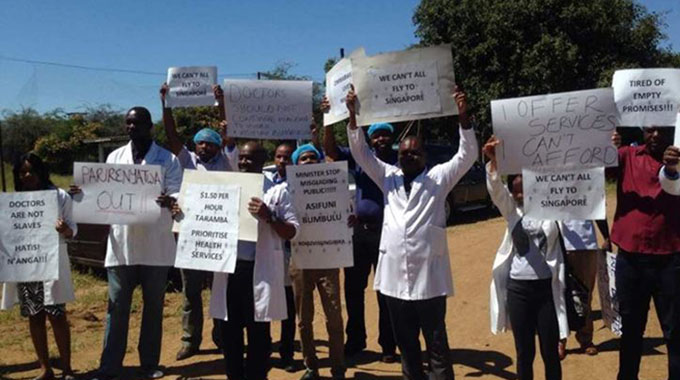Constitutional lessons for Goromonzi women

Angeline Musakwa Features writer
Women in rural areas are important to society as they make the majority that provide the nation with food through agriculture, rights activists say.
They also play an unheralded function of keeping rural homesteads intact where many go during holidays, sometimes showing little appreciation.
However, despite being responsible for most work in fields, rural women are disenfranchised when it comes to land ownership. Many of them fall victim to lack of knowledge of constitutional matters.
A local organisation has been at the forefront of efforts to ensure women break out of the prejudice they face and gain access to resources they are well known to utilise, land.
Jekesa Pfungwa Vulingqondo (JPV) has ensured a way to self-sustenance, which protects women from possible abuse based on their low incomes.
At the recent belated commemoration of International Rural Women’s Day at Gosha Primary School in Goromonzi, women shared their experiences and how they were able to fight abuse.
Being a woman living in the rural areas and having little knowledge about her rights, Progress Chiwanika (25) from Goromonzi narrated how she battled abuse.
“I was in my own prison from the time I got married. My husband would beat me every day for no apparent reason,” she said.
She added, “I was suffering inside, and the one thing that kept me from reporting the issue was that I did not have the confidence to be independent, take care of my kids and send my husband to jail.
“It took me a while to understand that my rights were being violated as I suffered both verbal, emotional and physical abuse. I lost a lot of weight trying to deal with the abuse alone, receiving a thorough beating from my husband almost every time he felt like it,” Chiwanika reflected.
Aware of her constitutional rights through lessons and support, Chiwanika reported the issue to the police and the husband was arrested.
In the process, she gained self-confidence and independence.
“Since then I have been staying with my parents and I sell snacks (maputi) at a local primary school to provide for my children. I hope to open a tuck-shop soon or venture into other businesses like poultry,” she added.
Jane Kunaka, another beneficiary of the initiative, spoke on the impact of the constitutional education initiative, which has brought a lot of awareness on the rights of women largely ignored in rural areas.
“We are often abused in our homes and so are our neighbours. At times we don’t know where to take up the issues but Jekesa has been very helpful especially when it comes to providing a platform where we can discuss our issues,” Kunaka lamented.

Progress Chikwanika, beneficiary of Jekesa Pfungwa
There have been efforts to address meaningful participation of women, among them raising awareness on the Constitution. This is aimed at raising political consciousness at the grassroots, which will inspire women to take up new roles and identities as well as develop new skills.
Assistant District Administrator Mahommed Hamandishe said it is a Government mandate to make sure that women are educated and empowered to exercise their rights and embrace their freedoms.
“There are a lot of important things, but it is the human capital that is crucial. Vision 2030 cannot be realised if women are not seen in the development of the country.”
“We should be making a deliberate effort to empower women, making sure that they are educated, represented in all decision making processes,” Hamandishe added.
Member of Parliament for Goromonzi District Honourable Ozias Bvute supports the empowerment of rural women, because this is the grassroots that will help the nation to achieve its goals.
“Empowering rural women is a prerequisite to fulfilling the vision of sustainable development goals that aim to end poverty and hunger, achieve food security and empower all women and girls,” Honourable Bvute said.
Proweb Women Achievers Awards role model of the year 2018 Bertha Jambaya, who is JPV director, explained that the aim of the initiative is to help rural women understand their rights and make sure they are respected.
“This project we are having in Goromonzi is more on making rural women accountable to their authorities because some women tend to think that some things are only meant for men. We also train them on the Constitution, because they were not aware of their rights,” she said.
Jambaya further highlighted that JPV’s mission was to create a platform for rural women to discuss challenges in their communities.
“We are encouraging women to be independent and be able to generate money through businesses. From small-scale, selling tomatoes to move and sell as a collective group in supermarkets,” Jambaya added.
JPV has about 550 members in Goromonzi alone and they also have members in all the provinces countrywide.
JPV members say that they have been helped and empowered by taking part in the initiative as they are now aware of their rights, and confident to venture into business.









Comments